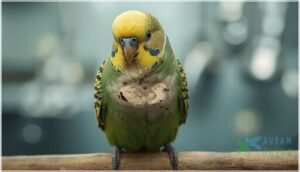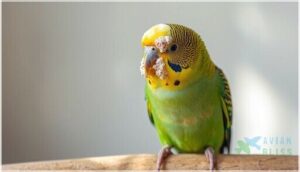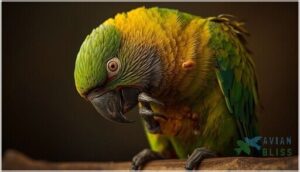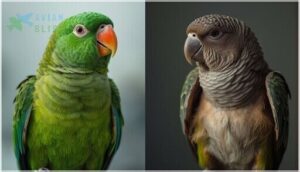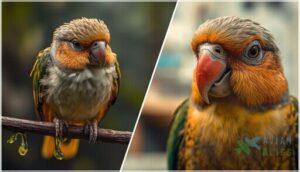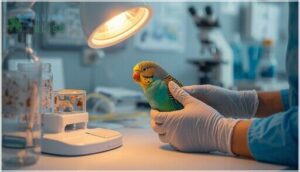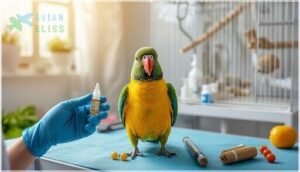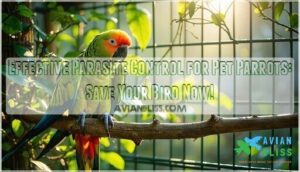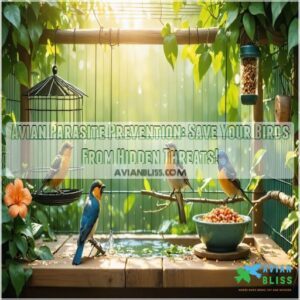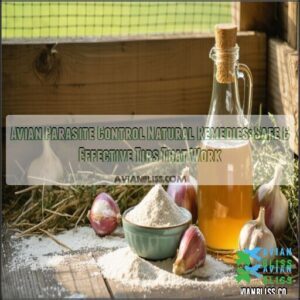This site is supported by our readers. We may earn a commission, at no cost to you, if you purchase through links.
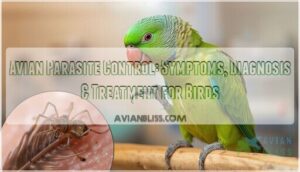
Your parrot stops preening, its feathers lose their sheen, and you notice it scratching more than usual. These aren’t quirks—they’re early warnings of parasite infestation, a threat that affects birds far more commonly than most owners realize.
External mites, internal worms, and respiratory parasites work silently, draining your bird’s health while often remaining invisible to the untrained eye. Left unchecked, even minor parasitic burdens escalate into serious conditions like anemia, respiratory distress, and severe weight loss.
Recognizing avian parasite control symptoms birds display requires understanding what to look for, from subtle behavioral shifts to visible skin lesions. Effective intervention starts with knowing which parasites target your bird and how they manifest their presence through specific, identifiable signs.
Table Of Contents
- Key Takeaways
- Common Avian Parasites in Birds
- Recognizing Symptoms of Parasite Infestation
- Diagnosing Parasitic Diseases in Birds
- Effective Parasite Control Methods
- Preventing Future Parasite Infestations
- Frequently Asked Questions (FAQs)
- How do I know if my bird has a parasite?
- How do birds get rid of parasites?
- What are the symptoms of external parasites in birds?
- What are three symptoms of a parasite infection?
- Can birds develop immunity to parasites?
- How do seasonal changes affect parasite activity?
- Are some bird species naturally parasite-resistant?
- Can parasites transfer between birds and humans?
- Do indoor birds need parasite prevention?
- Can parasites spread between different bird species?
- Conclusion
Key Takeaways
- Parasites in birds—external mites, internal worms, and respiratory invaders—drain health silently through anemia, weight loss, and respiratory distress, requiring you to recognize early behavioral shifts like increased scratching, feather damage, and digestive changes before infestations escalate.
- Effective diagnosis combines veterinary physical examinations checking for crusty lesions and feather damage with environmental sampling of cages and perches, since parasites breed in contaminated bedding and spread through direct contact or wild bird exposure.
- Treatment demands targeted medications like ivermectin or pyrethrins paired with thorough environmental disinfection using EPA-registered products, as medication alone won’t eliminate eggs and larvae harboring in your bird’s cage.
- Prevention through weekly cage sanitation, 30-day quarantine for new birds, mesh barriers against wild bird contact, and annual veterinary fecal tests stops infestations before symptoms appear, making consistent action more effective than reactive treatment.
Common Avian Parasites in Birds
Parasites pose a persistent threat to your bird’s health, operating both on the surface and deep within essential systems. Understanding the specific types of parasites that affect avian species helps you recognize early warning signs and seek appropriate veterinary care.
Understanding avian parasites helps you recognize early warning signs and protect your bird from persistent health threats
Your bird may encounter external invaders like mites and lice, internal threats including worms and protozoa, or respiratory parasites that compromise breathing.
External Parasites (mites, Lice, Fleas)
External parasites on your bird present a clear and present danger to their health. Mites, lice, and fleas exploit different niches on your bird’s body, making bird parasite control essential for their wellbeing.
Common External Parasites and Their Impact:
- Scaly leg mites burrow into skin, creating crusty growths around the beak, legs, and eyes.
- Feather mites consume keratin and oils, leading to fraying, breakage, and dull plumage over time.
- Red mites feed on blood nocturnally, causing anemia, restlessness, and visible irritation.
- Lice are highly host-specific chewing parasites that damage feathers through constant feeding activity.
- Fleas primarily affect poorly conditioned birds, potentially inducing anemia in small species.
Understanding parasite life cycles helps you recognize mite infestations early. Direct contact, shared perches, and contaminated nesting material enable transmission between birds. Poor bird hygiene, crowded housing, and wild bird exposure increase your flock’s vulnerability to parasite infestations.
Treating external parasites requires both topical applications and environmental management. You’ll notice frequent scratching, feather loss, red irritated skin, and black specks on perches when parasites establish themselves. Temperature and humidity directly influence how quickly these organisms reproduce and spread through your aviary.
Effective lice control and flea prevention demand consistent cage cleaning, routine veterinary assessment, and quarantine protocols for incoming birds. Regular audits using scientific study methods can help identify potential health issues in your flock.
Internal Parasites (worms, Protozoa)
While external threats live on feathers and skin, internal parasites attack from within. Intestinal parasites like roundworms, coccidia, and tapeworms disrupt intestinal health through tissue damage and nutrient theft.
Protozoan diseases, including giardiasis and trichomoniasis, cause malnutrition, diarrhea, and esophageal ulcers in your bird.
Understanding parasite life cycles and transmission routes helps you recognize worm infestations early, preventing protozoal infections before they compromise your bird’s condition.
Respiratory Parasites (air Sac Mites)
Air sac mites invade your bird’s respiratory system, creating infections that manifest as labored breathing, wheezing, and tail bobbing. These respiratory parasites complete their mite life cycle within air sacs, causing tracheal mites to spread through direct contact.
Watch for these respiratory symptoms:
- Persistent clicking sounds during breathing
- Open-mouth breathing with visible distress
- Coughing or gagging episodes
- Decreased activity levels
Effective avian treatment requires veterinary-guided parasite control and thorough environmental disinfection for parasite prevention.
Recognizing Symptoms of Parasite Infestation
Early detection is your best defense against parasitic disease in birds. You’ll need to watch for several distinct categories of symptoms, from visible changes in feathers and skin to subtle shifts in behavior and overall condition.
The following signs will help you identify whether your bird may be harboring external, internal, or respiratory parasites.
Feather Damage and Loss
Feather damage often signals external parasites like feather mites or scaly face mites at work. You’ll notice feather plucking, feather breakage, or plumage disorders when these parasites irritate your bird’s skin. Air sac mites can also contribute to overall poor feather condition.
Molting issues, brittle shafts, and beak damage may appear alongside the infestation, signaling that your bird needs immediate veterinary attention.
Skin Irritation and Crusts
Crusts on your bird’s beak, legs, or around the eyes often point to scaly face mites or other external parasites causing skin irritation. You’ll see raised, crusty lesions, feather damage, and scaliness that may invite secondary skin infections if untreated.
Feather mites and lice can produce similar signs, including beak crusts and inflamed patches.
Prompt scaliness treatment with ivermectin or pyrethrin-based products, combined with thorough environmental cleaning, stops the infestation before it worsens.
Behavioral Changes (scratching, Restlessness)
Persistent scratching behavior signals your bird is fighting itchiness from external parasites like mites or lice. You’ll notice increased preening, head rubbing against perches, and beak wiping as your bird tries to relieve irritation.
Restlessness signs include pacing, frequent wing flapping, and sleep disturbances—especially at night when red mites feed.
These agitation factors and stress responses, combined with feather damage, confirm ectoparasites are affecting bird behavior and health.
Weight Loss and Poor Condition
Chronic parasitic burden drains your bird’s reserves, causing measurable weight loss and declining body condition over weeks. You’ll see reduced muscle mass, dull poor plumage, and a prominent keel bone—classic signs of malnutrition effects and nutrient deficiency.
Internal parasites steal nutrients, triggering avian anemia and emaciation despite normal food intake. Effective weight management requires identifying the parasite load and restoring your bird’s nutritional balance through targeted parasite control.
Digestive and Respiratory Signs
Digestive problems—diarrhea, bile-stained droppings, vomiting—signal intestinal parasites robbing your bird of nutrients. Studies show diarrhea frequency jumps 40 percent in parasitized birds, often accompanied by weight loss despite normal appetite.
Respiratory issues like wheezing, open-mouth breathing, or nasal discharge point to air sac mites or tracheal parasites. Avian anemia and breathing difficulties demand immediate veterinary attention, as parasite infections in birds can escalate rapidly without proper treatment.
Diagnosing Parasitic Diseases in Birds
Accurate diagnosis forms the cornerstone of effective parasite control in your bird. Your avian veterinarian will employ several diagnostic methods, ranging from direct visual assessment to environmental inspection, to identify the specific parasites affecting your pet.
These techniques allow for precise treatment targeting and help prevent unnecessary medication use.
Visual and Physical Examination
When your avian veterinarian conducts a thorough physical examination, they’re looking for telltale signs that parasites leave behind. This systematic process includes several critical checkpoints:
- Feather Inspection reveals dull, frayed plumage or visible mites clinging to feather shafts
- Beak Examination detects crusty growths characteristic of scaly face mites
- Skin Lesions appear as reddened, flaky patches around the vent or feather follicles
- Eye Swelling and crusting indicate potential parasitic irritation
- Vent Check uncovers inflammation or abnormal discharge
Your veterinarian may also observe respiratory symptoms like wheezing or tail bobbing. Diagnostic testing, including skin scrapings and microscopic analysis, confirms bird parasite identification and guides parasite diagnosis for targeted treatment.
Identifying Parasites in The Environment
Beyond examining your bird, your veterinarian investigates the environment where parasites breed and spread. Environmental sampling reveals eggs, larvae, or mites lurking on perches, bedding, and cage surfaces—critical clues about the parasite lifecycle. Sticky tape impressions and substrate sampling detect fomite transmission risks from contaminated tools or accessories.
Poor cage hygiene creates breeding grounds, while wild bird exposure introduces vectors carrying parasites in birds. Routine cage maintenance and cleaning disrupts these cycles. Water dishes harbor protozoan oocysts, and dust contains respiratory parasites.
Thorough bird hygiene and cleaning, combined with strategic vector control measures, form your first line of defense in preventing parasite infestations.
Effective Parasite Control Methods
Once your vet has diagnosed a parasitic infection, treatment focuses on eliminating the parasites from both your bird and its environment. Effective control combines targeted medications, thorough environmental sanitation, and supportive care to restore your bird’s health.
The following methods represent the core strategies used to eradicate parasites and prevent reinfection.
Medication Options (ivermectin, Pyrethrins, Moxidectin)
Treatment success hinges on choosing the right antiparasitic agent for your bird’s specific infestation. Ivermectin targets external and certain internal parasites, while pyrethrin-based sprays handle feather mites and lice effectively. Moxidectin treats air sac mites and systemic infections. Your veterinarian determines proper dosage guidelines, administration routes, and treatment duration based on your bird’s weight and species.
Key medication safety considerations include:
- Following species-specific dosing to prevent toxicity
- Rotating chemical classes for resistance management
- Choosing topical versus oral routes appropriately
- Monitoring response throughout treatment duration
- Scheduling follow-up examinations to confirm parasite elimination
Environmental Cleaning and Disinfection
Medication alone won’t eliminate parasites if your cage harbors eggs and larvae. Remove organic matter with soap and water before applying EPA-registered disinfectants effective against avian pathogens—follow label directions for contact time and dilution. Adequate ventilation during drying maximizes effectiveness.
| Cleaning Stage | Action Required |
|---|---|
| Pre-cleaning | Remove droppings, food debris with soap |
| Disinfection | Apply EPA-registered product per label |
| Drying | Verify air exchange, document completion |
This systematic approach assists long-term biosecurity compliance.
Natural and Supportive Remedies
While some owners explore garlic, apple cider vinegar, or diatomaceous earth, none reliably eliminate parasites and can’t replace veterinary-approved treatments. Probiotics and dietary adjustments may support gut resilience but won’t kill organisms. Essential oils risk toxicity in birds.
Focus instead on proven parasite control and prevention methods, and consult your avian vet before introducing any herbal treatments or supplements. Stress reduction and environmental enrichment support immunity but never substitute targeted therapy.
Preventing Future Parasite Infestations
Prevention is the most effective strategy for managing avian parasites in your bird’s environment. You can greatly reduce the risk of infestation through consistent husbandry practices, environmental controls, and veterinary oversight.
The following approaches will help you maintain a parasite-free environment for your birds.
Routine Cage and Accessory Maintenance
Regular cage sanitation forms the backbone of effective parasite control and prevention in your avian companion. Clean your bird’s cage weekly with a 1:32 bleach solution, removing and replacing substrate at the same interval.
Disinfect perches, toys, and feeders every one to two weeks, maintaining a documented cleaning schedule.
This consistent environmental management reduces parasite harborage and aids in pet bird care and avian health issues prevention.
Quarantine Procedures for New Birds
Before introducing any new bird to your flock, establish a dedicated quarantine space for at least 30 days—ideally 6–8 weeks.
Schedule a health screening with your avian vet upon arrival, enforce strict biosecurity measures with separate equipment and clothing, and document all observations.
These isolation protocols protect your existing birds from potential avian health issues and allow proper bird acclimation under veterinary advice for birds.
Limiting Exposure to Wild Birds
Wild birds carry parasites that can quickly spread to your flock through direct contact or contaminated droppings. To protect your birds’ health through proper avian enclosure design and outdoor access control, implement these wild bird barriers:
- Install fine mesh (less than 1cm openings) around outdoor aviaries to prevent wild bird and pet bird interactions
- Cover food and water stations during free flight risks
- Remove attractants like spilled seed that draw wildlife
- Monitor mesh size importance regularly for gaps or damage
These avian parasitology-informed strategies balance wildlife conservation and birds’ safety while reducing parasite transmission.
Importance of Regular Veterinary Checks
Schedule annual exams with an avian veterinarian to catch parasites before symptoms emerge. Your vet visit schedules should include fecal tests and physical checks that form thorough veterinary care plans.
Diagnostic testing detects subclinical infections, while bird health monitoring tracks weight and feather quality.
An avian vet performs parasite risk assessment based on your bird’s environment, supporting long-term avian health and wellness through customized avian disease prevention strategies.
Frequently Asked Questions (FAQs)
How do I know if my bird has a parasite?
Watch for frequent scratching, damaged feathers, or crusty buildup around the beak and legs. Loose droppings, unexplained weight loss, and breathing difficulties also signal parasites.
Diagnostic testing by an avian veterinarian confirms infestation.
How do birds get rid of parasites?
Birds don’t eliminate parasites on their own. Veterinary-prescribed pharmacologic interventions, like ivermectin, are necessary for parasite clearance.
Environmental sanitizing, proper bird hygiene, and immune support through nutrition help treatment options work effectively against parasite infections.
What are the symptoms of external parasites in birds?
External parasites cause feather damage, skin irritation, and crusty lesions on your bird’s beak or legs. You’ll notice increased scratching, restlessness at night, and visible mites or lice during close inspection of feathers.
What are three symptoms of a parasite infection?
Parasitic problems present predictably: watch for persistent scratching paired with feather damage, digestive disruption like diarrhea or weight loss, and respiratory distress including labored breathing.
These infection signs demand immediate health monitoring and parasite detection.
Can birds develop immunity to parasites?
Your bird’s immune system can develop partial resistance to specific parasites through repeated exposure, but this adaptive response varies by parasite species, genetics, nutritional status, and overall health—it’s never complete protection.
How do seasonal changes affect parasite activity?
Seasonal parasite shifts reflect temperature effects and humidity influence on parasite life cycles. Warmer months increase ectoparasite activity, while rainfall expands endoparasites.
Climate change impacts avian parasitology, altering parasitic diseases patterns and complicating preventative strategies year-round.
Are some bird species naturally parasite-resistant?
Yes, certain psittacines and other avian species demonstrate genetic resistance through enhanced immune response and natural defenses shaped by parasite coevolution.
Host adaptation varies markedly, influencing susceptibility to parasitic diseases in birds across different populations.
Can parasites transfer between birds and humans?
Though the bridge between species rarely connects, zoonotic transmission does occur—certain avian parasites, particularly mites and protozoa, can cause human infection. These infections typically result from direct contact, contaminated environments, or handling infected birds, especially in immunocompromised individuals.
Do indoor birds need parasite prevention?
Even with limited outdoor exposure, your pet birds benefit from veterinary-guided parasite prevention.
Regular bird health checks, household sanitation, and preventative measures reduce transmission risks, especially in multi-bird homes or when introducing new avian companions.
Can parasites spread between different bird species?
Parasites can cross-infect multiple bird species through direct contact, shared resources, or fomites. Cross-species transmission depends on parasite host range and avian ecosystem dynamics, while proper quarantine limits fomite transmission between birds.
Conclusion
Parasites persist when prevention falters. Your vigilance determines whether avian parasite control symptoms birds display remain early warnings or escalate into life-threatening conditions.
Regular cage sanitation, quarantine protocols, and veterinary examinations create layered defense against mites, worms, and respiratory invaders.
Recognizing feather loss, scratching, and weight changes early means treatment succeeds before irreversible damage occurs. Your bird’s health depends on consistent action—not reactive intervention after parasites establish strongholds in their bodies or environment.
- https://www.petmd.com/bird/conditions/digestive/c_bd_gastrointestinal_parasites-giardiasis
- https://birdvetmelbourne.com/worms-in-birds/
- https://poultrydvm.com/condition/coccidiosis
- https://poultry.extension.org/articles/poultry-health/internal-parasites-of-poultry/
- https://cwhl.vet.cornell.edu/disease/avian-trichomonosis

